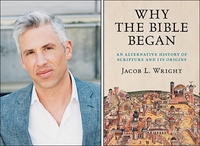Why the Bible Began: An Alternative History of Scripture and its Origins
Jacob L. Wright. Cambridge Univ, $34.99 (300p) ISBN 978-1-108490-93-1
In this landmark study, Wright (War, Memory, and National Identity in the Hebrew Bible), an associate professor of the Hebrew Bible at Emory University, analyzes why and how “the most influential corpus of literature the world has ever known” originated in “a remote region of the ancient world, rather than... the centers of civilization.” According to Wright, scribes began working on the Torah following the destruction of Jerusalem in 586 BCE and intentionally wove their peoples’ subjugation by the Babylonian Empire into the narrative, creating a history that reexamined “every facet of their existence.” Mostly, though, the “biblical project” was an answer to the smoldering rifts between the Northern kingdom (of Israel) and the Southern kingdom (of Judah), in hopes that the vision of “a nation that transcends the borders of its kingdoms” would prove “the populations of these two rival states could be one people.” Wright paints a fascinating and multilayered portrait of the scriptural authors, who “built questioning into the system of the Bible” (interspersing scripture with “contradictions that undermine their overall message, requiring the reader to ponder the problems and take a personal stance”) and whose writings provide the modern reader with insights into “questions of corporate life, common welfare, and collective survival.” Thought-provoking and scrupulously researched, this is a tour de force. (Oct.)
Details
Reviewed on: 09/13/2023
Genre: Religion
Compact Disc - 979-8-228-32565-4
MP3 CD - 979-8-228-32566-1
Open Ebook - 1 pages - 978-1-108-85924-0
Paperback - 500 pages - 978-1-108-79668-2


